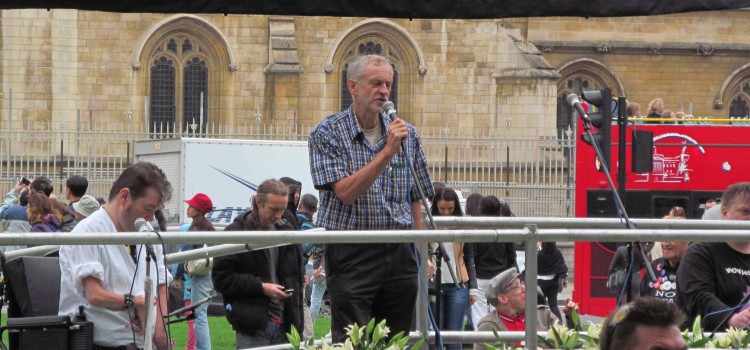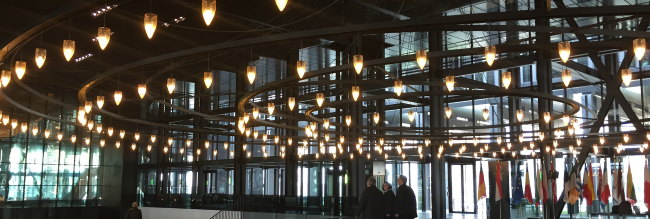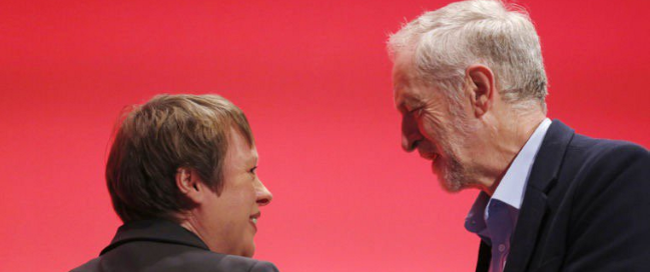This was my storify about the coup against Jeremy Corbyn in 2016.
Labour’s Leadership Lost


This was my storify about the coup against Jeremy Corbyn in 2016.

I am fed up hearing about the PLP’s 9m vote mandate. Firstly, the total labour vote is ~8.7m. Secondly just above 5m voted for winning candidates i.e.the members of the PLP, the other 3.7m voted for Labour candidates that lost and thirdly, they won because they were Labour candidates, and that is chosen by the Party membership. …

Many the implications of the vote to leave the EU has been exercising my mind. I have finally got my notes & thoughts to publish my initial views on the politics of the aftermath; this article attempts to limit itself to the events and thoughts of the first week after the referendum. I have published them as at the date I started my storify where I collected the sources I wanted to quote. This is because it is one of a planned series, I plan to follow up with a piece on immigration, one on Labour Party and Left unity and one on the mutation of capitalism and politics.
One of the reasons for my delay was that I was asked for a number of quotes in the IT trade press which took some writing time. I have posted the complete quotes as three articles in linkedin pulse, on Cybersecurity, Privacy & Trade and the single market, covering innovation, TTIP & Privacy and net neutrality. …

The highest levels of international judiciary have been busy over the last week, I report and comment on the Microsoft vs. FBI on linkedin Pulse, in an article called “Citizens Win”. It was quite simple in the end, the law under which the FBI was seeking search warrant powers was not on of the post 911 laws, but an earlier one and the US District Court says that the law grants no power of inspection abroad. The spooks are going to have to apply for an Irish warrant. In Europe however, Tom Watson’s & David Davies’s judicial review on DRIPA have reached the Advocate General. This reported by Tom Watson here, and by Glyn Moody here. Watson writes about the need for strong judicial review of the search warrants, and Moody brings up that mass surveillance can only be used in the fight against serious crime. …

That was a shock, a soul deadening shock. In the words of the meme, I felt a grief for the loss of the future I thought I and my children had. How did this happen? How could we have voted to follow the corrupt and the vain, Johnson and Farage. The answer may have been most rapidly and accurately identified by John Harris of the Guardian in an article, entitled “If you’ve got money, you vote in … if you haven’t got money, you vote out” in which he identifies those whom we’ve known about for years, who can be described in a number of ways. In my micro blog post, “Pebbles”, I describe them as ‘globalisation’s losers’, the working class whose towns, communities and institutions have been smashed during the neo-liberal ascendency, communities that Labour stopped listening to and representing in 1997 leading to a loss of 5 million votes between 1997 and 2010. Making this even more problematic for Labour is that nearly ⅔ of Labour’s voters, voted remain, and just as globalisation’s losers cannot be ignored, nor can Labour’s majority of remainers. What is to be done? …

I was hoping to write a piece on a response to the “Leave”vote and a response to the Chakrabarti Inquiry but Ann Black of Labour’s NEC in a circular wrote and asked what her maillist thought of the shenanigans. I had to reply and decided to share it with you all. She stated she planned to vote to include Jeremy on the ballot paper, which I support but asked for opinion on if there should be a freeze date for inclusion on the electoral roll and what to do about registered supporters. I argue to include all members, including those that have just joined in the ballot for Leader. I also argue that the Party should offer its supporters an opportunity to register and join in the ballot. I also commented that the collapse of the National Policy Forum is an opportunity. …

He's very unlucky, at the least! Let's look at the Garden Bridge! Ooops! Here's a storify story dealing with the bridge, Convoy's Wharf, his management of the Met and relationships with its Commissioners, his "chicken feed" fees from the Telegraph and his fast track appointment of Veronica Wadley to the Arts Council. ...
Gary Younge in the Guardian,”Brexit: a disaster decades in the making”,
Things he says worth remembering,
On the day after the EU referendum, many Britons woke up feeling that the country had changed overnight. But the forces that brought us here have been gathering for a very long time
When leaders choose the facts that suit them, ignore the facts that don’t and, in the absence of suitable facts, simply make things up, people don’t stop believing in facts – they stop believing in leaders.
Labour could also reposition itself, in the knowledge that it could keep winning elections even as it kept losing voters. Those who voted for Brexit tended to be English, white, poor, less educated and old. With the exception of the elderly, these have traditionally been Labour’s base. But the party has been out of touch with them for some time.
…The coalition of metropolitan liberals, city-dwellers, ethnic minorities, union members, working-class northerners and most of Scotland slowly began to fray.
Over the weekend following the referendum, I created a storify “Has the earth moved for you?”, the shock seemed seismic and I quoted myself, Robert Ford and Paul Cotterill. I blamed a long time failure of the pro-EU advocates to carry their weight over decades, Ford analyses the political movement of the Labour Party and its once supporters and Cotterill proposes new practice based on collective action rather than political education. This piece looks at Paul Mason, a reluctant Remainer and Labour Party member’s reaction to the Leave vote, talks about how I felt over that weekend, re-posting the Winnie the Pooh meme https://davelevy.info/grief/ and concludes with what I consider the policy compromise to be, although by this time, Labour’s debate has become one of its internal democracy and governance. (I leave the continuing campaign to remain for a later post, maybe).
Pro-Europeans long-term cowardice with the honourable exceptions compounded by Cameron’s tactics of being persuaded by his own negotiation brilliance. If we add the weak Remain campaign which focused exclusively on the fear of economic decline and offered no hope for the future and no internationalist aspiration then we can see that the advocates for Remain were always chasing the result.
Robert Ford who is Professor of Political Science at Manchester University and co-author of ‘Revolt on the Right’, repeats the arguments that there is a social strata, the “Left Behind” i.e. left behind by globalisation who are moving to UKIP, due to New Labour’s support for globalisation and the growing dichotomy between the Party membership, its elected representatives and themselves. New Labour’s appeal to middle England at the expense of its core vote, leading to 3m of them not voting Labour in 2001, possibly the shortest political suicide note in history was the start point of this alienation. They learnt to stop voting Labour. This analysis is powerfully echoed by John Harris in the Guardian in his article, “If you got money, you vote in … if you haven’t got money you vote out”. Brilliant powerful writing, showing a journey from macro-economic and industrial policy via triangulation to powerlessness and growing anger. He doesn’t make a lot of it, but the MPs expenses affair, condoned by the then Labour government and the press hounding of the MPs, (⅔ were 100% compliant) undermine the trust that electors have. In the case of Labour’s lost voters, it was the electoral strategy of triangulation that deliberately ignored the views and wishes of Labour’s historic core vote.
This leaves us with a country split between north and south, young and old, haves and have nots, some say it’s also about education but the expansion of University access from 4% to 50% over the last 40 years makes this a proxy of the young and old, although it’s called out in the headline of tidjane thiam CS’s CEO’s Huffpo piece on Brexit. It would probably serve us better if the headline called out his distress and surprise at the level of poverty and deprivation in Tower Hamlets and which he contrasts with this activity as a government minister in his home state of Cote D’Ivoire. The article, based on an interview states,
The banker believes the solution lies in a more redistributive tax system – even if that meant raising taxes – to ensure those who have lost out to globalization are not left feeling disenfranchised.
Paul Mason, on the morning after agrees. Has a 10 point plan, but reckons there are three causes.
The only way Labour can unite these culturally different groups (and geographic areas) — so clearly dramatised by the local-level results — is economic radicalism; redistribution, well-funded public services, a revived private sector and vibrant local democracy is a common interest across both groups.
But if you trace this event to its root cause, it is clear: neoliberalism is broken.
He argues that Labour has to argue for Brexit, the softest Brexit i.e. the EEA, a migration break but also anti-austerity.
One problem for Labour is that nearly 70% of Labour’s vote, voted to remain, and many of these want a free movement of people; they want to be able to work, live, love, holiday, retire, own property and study in Europe. You can’t please these people and those that want to “Control Immigration”
Paul developed his ideas and a day later published this, in the Guardian. He argues to accept the decision, to call for an election to be fought in alliance with the SNP and Plaid Cymru to create a government with a mandate to negotiate a social democratic Brexit. …

Tomorrow is the referendum voting day. As the ‘Leave’ campaign doubled down on immigration, last week, having lost the arguments on the economy, citizenship, sovereignty, and peace, I planned to write a final piece on immigration, arguing that it can’t and shouldn’t be stopped, and that the Left (and decent) arguments are that we should build houses, reform the housing market, build schools, empower teachers, make higher education free, re-establish skills training, establish and enforce a minimum wage and reset the balance of power in the work place so that Unions i.e. workers can regulate employment conditions again. We need people to come here to work, and we should be proud that we have built a society that refugees want to come to, so that they can be safe. …